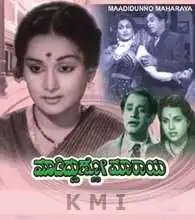“Madiddunnu Maharaya” is a classic Kannada film released in 1954, directed by H. L. N. Simha, who was known for his significant contributions to Kannada cinema. The film stars R. Nagendra Rao, Rajkumar, Pandari Bai, and Narasimharaju in key roles. This movie is an adaptation of a popular play and showcases a blend of drama, romance, and moral values, typical of the period’s cinematic style.
The plot of “Madiddunnu Maharaya” centers around a morally upright and principled man named Maharaya, played by R. Nagendra Rao. Maharaya is deeply respected in his village for his wisdom and fairness. His life takes a dramatic turn when he decides to take a strong stand against social injustices and the exploitation of the poor by the wealthy and powerful.
Rajkumar, in one of his early roles, plays the character of a young, idealistic man who looks up to Maharaya. His character is pivotal to the story as he represents the new generation that is inspired by Maharaya’s values and determination. Rajkumar’s performance is notable for its intensity and sincerity, laying the groundwork for his future superstardom in Kannada cinema.
Pandari Bai plays the role of Maharaya’s devoted and supportive wife. Her character is the emotional backbone of the story, providing strength and solace to Maharaya during his struggles. Pandari Bai’s portrayal of a compassionate and resilient woman resonates with the audience, adding depth to the film’s emotional narrative.
Narasimharaju, known for his comedic talent, provides the necessary comic relief in the film. His character, while light-hearted, also carries a subtle message about the importance of humor and optimism in overcoming life’s challenges. His performance balances the film’s more serious and dramatic moments, making it more engaging for the audience.
The story of “Madiddunnu Maharaya” unfolds as Maharaya confronts various challenges posed by the village’s wealthy landowners, who exploit the poor. His unwavering commitment to justice and equality earns him both respect and enmity. The film delves into themes of social justice, the fight against corruption, and the importance of standing up for what is right, reflecting the socio-political climate of the time.
H. L. N. Simha’s direction ensures that the film remains focused and impactful. The narrative is tight, with well-developed characters and a storyline that keeps the audience invested in Maharaya’s journey. The dialogues are poignant, often highlighting the social issues and moral dilemmas faced by the characters.
The music, composed by R. Sudarshanam, complements the film’s narrative beautifully. The songs are both melodious and meaningful, enhancing the emotional and thematic depth of the film. The musical score plays a crucial role in conveying the film’s mood and accentuating key moments in the story.
In conclusion, “Madiddunnu Maharaya” is a significant film in Kannada cinema, remembered for its strong moral message, powerful performances, and engaging storytelling. The film’s exploration of social justice and moral integrity continues to resonate with audiences, making it a timeless classic.


